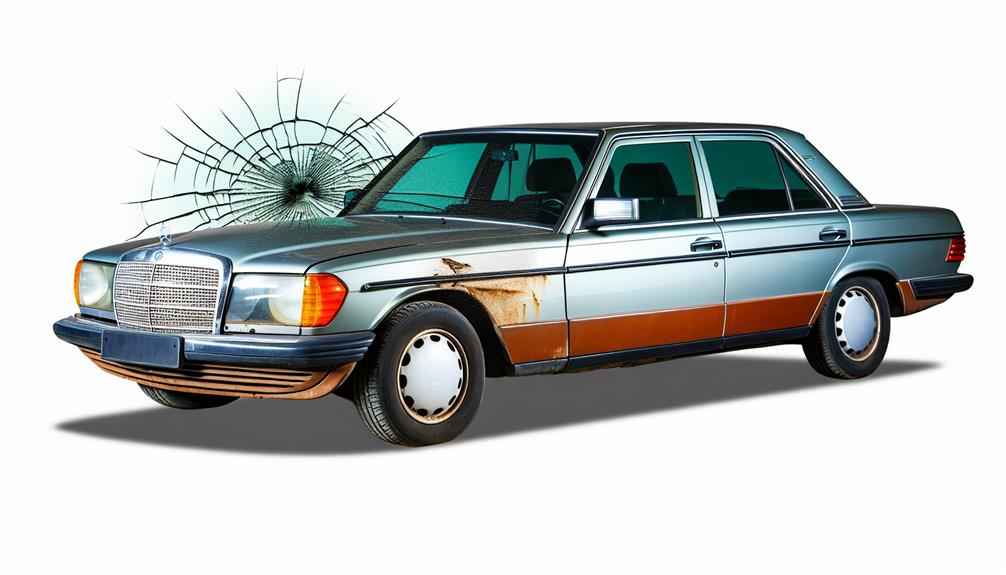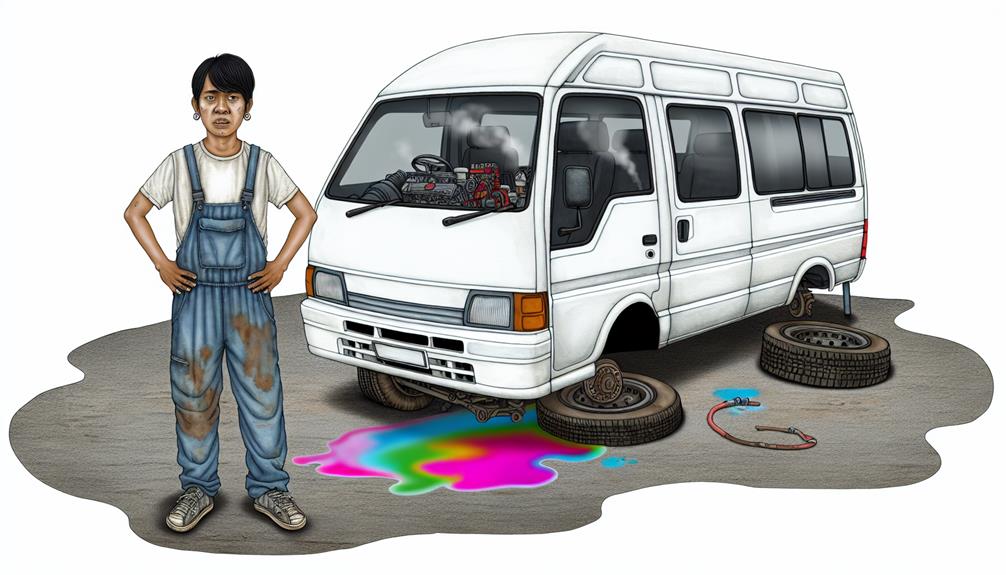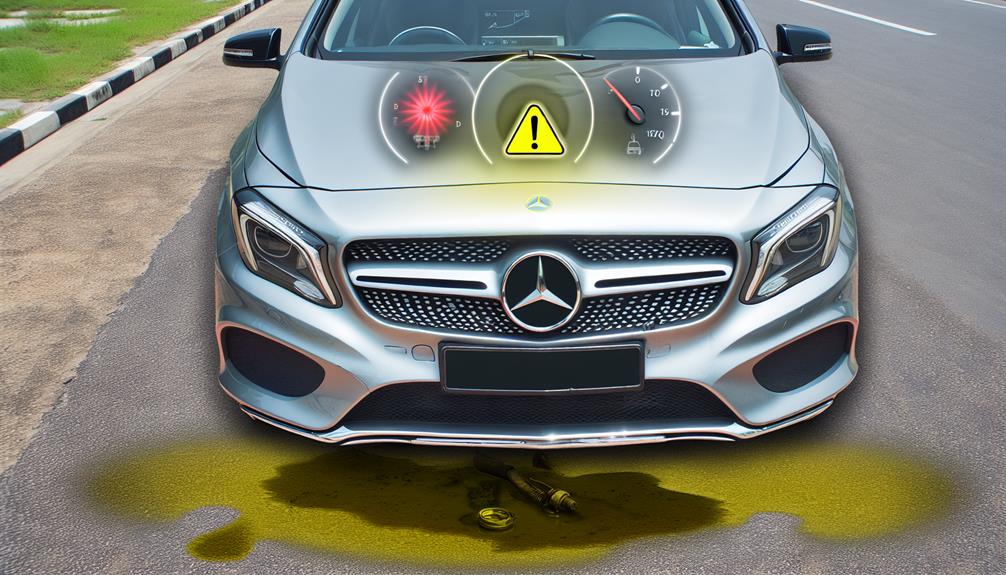When cruising in your Mercedes W124, keep an eye out for rust spots sprouting like unwanted daisies thanks to water-based paint and weaker corrosion protection. The wiring harness, prone to biodegradation, might give you a light show of electrical malfunctions. Don't let that single-row timing chain stretch your patience; consider an upgrade to a double-row one before engine havoc strikes. And beware the lurking head gasket failures waiting to rain on your luxury parade. These are just the tip of the iceberg of issues in the world of Mercedes W124, where surprises abound.
Key Takeaways
- Head gasket failures plague Mercedes W124 engines.
- Aging wiring harnesses lead to electrical malfunctions.
- Rust issues threaten structural integrity in post-facelift models.
- Single-row timing chains prone to stretching, risking engine damage.
- HVAC system failures due to worn blower motors.
Corrosion Due to Water-Based Paint
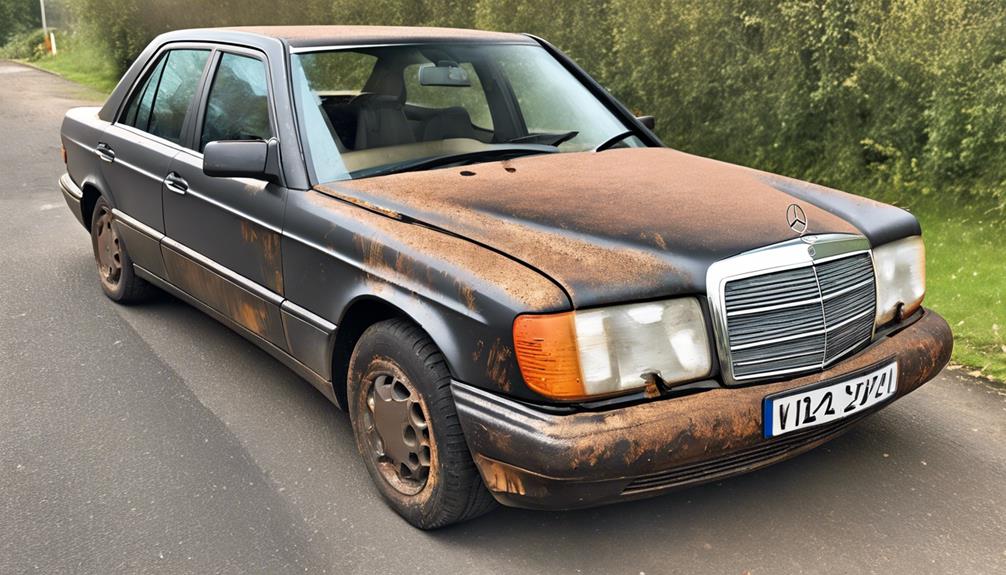
If you own a post-facelift W124 E-Class Mercedes, beware of potential corrosion lurking beneath the water-based paint used on these models. While the shift to water-based paint was an eco-friendly move, it brought along some unintended consequences. The corrosion protection offered by this type of paint isn't as robust as that of traditional solvent-based paints, leaving your car vulnerable to rust spots.
Regular inspections are key to catching any signs of corrosion early on. Keep an eye out for any bubbling or discoloration on the paint, as these could indicate underlying issues. Ensuring proper maintenance, such as washing off road salt in winter months and promptly addressing any scratches or chips in the paint, can go a long way in preserving the structural integrity of your beloved Mercedes W124.
Biodegradable Wiring Harness Issues
So, you've got a W124 with biodegradable wiring harnesses, huh?
Well, let's talk about how over time, the insulation on these harnesses breaks down, causing all sorts of electrical gremlins to haunt your ride.
Luckily, there are replacement options available to keep your Mercedes running smoothly and prevent any shocking surprises along the way.
Wiring Degradation Causes
When considering the common problems in Mercedes W124 models, one significant issue that stands out is the degradation of wiring due to the use of biodegradable materials in the harness construction. The biodegradable wiring harnesses in these vehicles deteriorate over time, leading to electrical issues, malfunctions, and potential safety hazards.
Symptoms of wiring degradation include electrical shorts, erratic behavior of components, and even fire risks. It's vital to replace the biodegradable wiring harness to prevent such failures and guarantee the safety and reliability of your Mercedes W124.
Upgrading to a non-biodegradable harness or conducting regular inspections can help prevent these wiring-related problems effectively.
Replacement Options Available
As we explore the Replacement Options Available due to biodegradable wiring harness issues in the Mercedes W124, upgrading to a non-biodegradable harness stands out as a wise choice for ensuring long-term reliability and preventing potential electrical failures.
The biodegradable wiring harnesses in some W124 models may be ticking time bombs, ready to cause havoc in your cherished ride. By opting for non-biodegradable wiring harnesses, you're effectively giving your car a new lease on life, shielding it from the troublesome electrical gremlins that can plague older vehicles.
DIY installation of the new harness is feasible for those willing to get their hands a bit dirty. So, why wait for sparks to fly? Upgrade now and bid adieu to those potential electrical nightmares.
Single-Row Timing Chain Problems
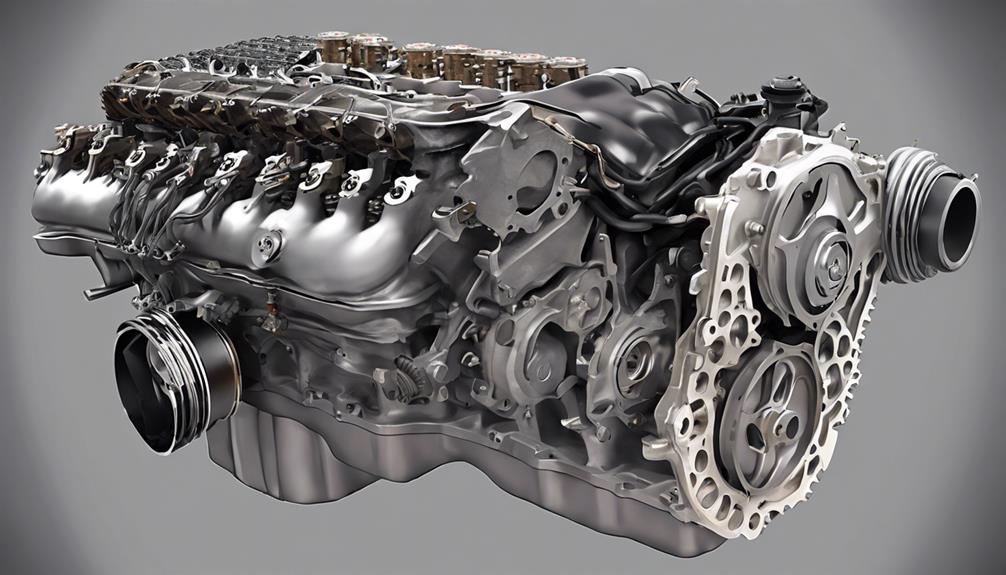
If you own a Mercedes W124 model with an early M102 engine, the single-row timing chain lurking within could be a ticking time bomb for your vehicle's longevity. These chains are notorious for stretching, potentially leading to catastrophic engine problems.
Imagine this: you cruising down the road in your beloved W124 E, only to have the engine give out unexpectedly due to a worn-out timing chain. The horror! To avoid such car nightmares, consider upgrading to a double-row timing chain.
This simple swap can save you from costly repairs and keep your engine purring like a contented feline. Remember, regular maintenance and inspections are key to catching timing chain issues before they spiral into major problems.
Head Gasket Failures in Various Engines
Head gasket failures plague a variety of engines in Mercedes W124 models, posing significant risks to engine performance and longevity. When it comes to these engines, especially the M102, M103, M104, and M111, you might find yourself facing troublesome oil leaks and noticing foamy coolant in the engine bay, signaling potential head gasket issues. Dealing with these failures can be a real headache, potentially leading to overheating, decreased engine performance, and even more severe engine damage if left unaddressed.
- Oil leaks are a common telltale sign of head gasket problems.
- The sight of foamy coolant in your engine could indicate a failing head gasket.
- Addressing head gasket failures promptly is essential to prevent costly repairs and maintain your Mercedes W124's engine health.
Rust Concerns in Post-Facelift Models
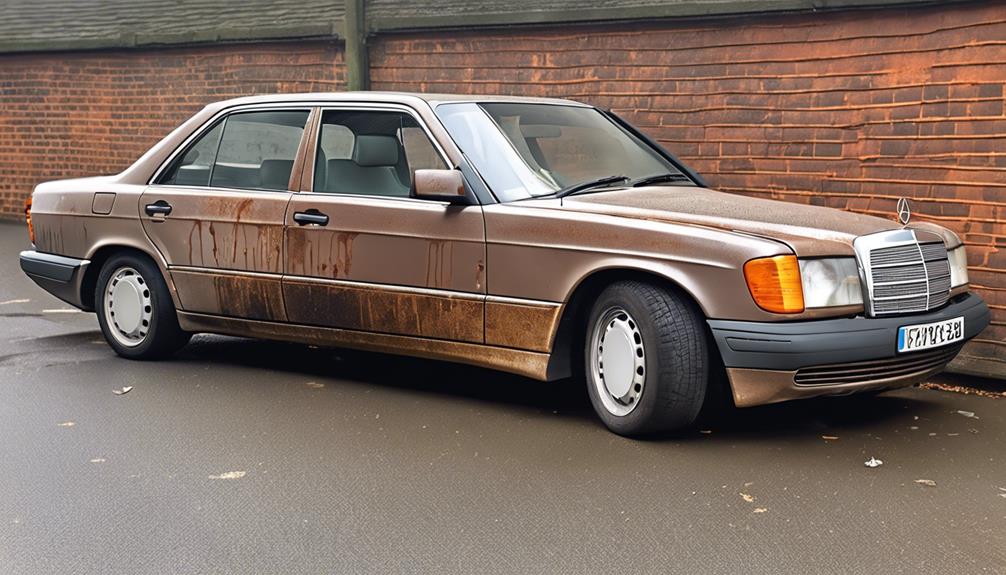
Dealing with head gasket issues can be a real headache. Moving on to discussing rust concerns in post-facelift models, it's important to address the prevalent rust problems seen in these later versions of the W124 E-Class.
Unlike their pre-facelift counterparts, post-facelift W124 E-Class models are unfortunately more susceptible to rust. This can wreak havoc on their structural integrity and lead to unsightly body damage. Regular inspections are essential for post-facelift owners; keeping a close eye on rust spots and monitoring the condition of the floorpan can help catch issues early on.
Rust isn't just a cosmetic problem; it poses a real threat to the longevity of your Mercedes-Benz. So, don't let this pesky corrosion take you by surprise. Stay vigilant, tackle rust head-on, and keep your post-facelift W124 shining on the road for years to come!
Diesel Particulate Filter Issues in OM603 Engines
If you're noticing your OM603 engine's performance taking a nosedive, it might be due to those pesky Diesel Particulate Filter (DPF) issues.
From filter regeneration problems to sensor malfunctions causing a ruckus, these can block your exhaust system faster than you can say 'OM603.'
Filter Regeneration Problems
Experiencing filter regeneration problems with the diesel particulate filter in OM603 engines of your Mercedes W124 can greatly impact engine performance and efficiency. Here are some key points to ponder:
- Ignoring DPF regeneration issues can lead to reduced power output and increased fuel consumption.
- Engaging in regular long drives at highway speeds can aid in the automatic regeneration process.
- Utilizing specialized cleaning additives or seeking professional cleaning services can help maintain peak DPF functionality.
Sensor Malfunctioning Concerns
When faced with sensor malfunctions in the Diesel Particulate Filter system of OM603 engines in your Mercedes W124, the impact on engine performance can't be overlooked. Faulty sensors triggering warning lights may lead to poor engine performance, affecting fuel efficiency in your beloved Mercedes W124.
These malfunctions not only disrupt your driving experience but also contribute to increased emissions. To maintain peak engine performance, addressing sensor issues promptly is key.
Regular diagnostic checks and sensor replacements are highly recommended to prevent extensive damage to the Diesel Particulate Filter system. Stay ahead of the game by ensuring your sensors are in top-notch condition; your Mercedes W124 will thank you by purring like a contented feline on the open road.
Exhaust System Blockages
Exhaust system blockages can turn your smooth-sailing Mercedes W124 into a coughing, sputtering disappointment due to diesel particulate filter issues in the finicky OM603 engines. To tackle this exhaust conundrum effectively, consider the following:
- Regular maintenance and inspections are important to prevent diesel particulate filter problems.
- Addressing these issues promptly can help maintain best engine function in your W124.
- Don't let reduced engine performance leave you stranded; keep an eye on potential blockages to make sure your Mercedes runs smoothly.
Stay ahead of the game by taking care of your diesel particulate filter – your W124's engine will thank you!
Timing Chain and Tensioner Replacements
To enhance the longevity and reliability of your Mercedes W124's engine, proactive replacement of the timing chain and tensioner is vital. Especially in the M102 engines, where early models sport a single-row timing chain that can wear out prematurely, leading to potential catastrophic failure.
It's like having a one-string guitar – sure, it might work for a while, but eventually, it's going to snap when you least expect it. Upgrading to a double-row timing chain and a more robust tensioner is like giving your engine a safety net, ensuring its durability and reliability for miles to come.
Neglecting this essential preventative maintenance is akin to playing Russian roulette with your wallet – because when that timing chain goes, it's not just the chain that breaks; it's your bank account too. So, be proactive, show your Mercedes W124 some love, and swap out that timing chain and tensioner before they decide to call it quits on you.
Frequently Asked Questions
What Is the Lifespan of W124?
You're in luck with the W124—known for its impressive lifespan exceeding 300,000 miles. Some enthusiasts boast over 500,000 miles on theirs. Regular care and addressing common issues keep these tanks cruising for miles on end.
Is W124 Easy to Work On?
Certainly, the W124 is a cinch to work on! With its accessible layout and straightforward components, you'll find maintenance tasks a piece of cake. Embark on, grab your tools, and enjoy the DIY fun!
How Good Is Mercedes W124?
You'll love the Mercedes W124 for its exceptional reliability, versatile engine choices, and robust construction. This car is a dream to own, provided you keep up with regular maintenance. It's a classic for good reason!
Why Is W124 Famous?
You adore the Mercedes W124 for its exceptional build quality, longevity, and over-engineered design. Its reputation for reliability and durability, diverse engine options, and strong enthusiast following worldwide make it a sought-after classic car.
Conclusion
So, if you're thinking about getting a Mercedes W124, be prepared for a few hiccups along the way. From corrosion to wiring harness issues, timing chain problems to rust concerns, this classic car definitely has its quirks.
But hey, with a little TLC and some timely maintenance, you can keep your W124 running smoothly for years to come. Just remember, every car has its flaws – it's all part of the adventure!





